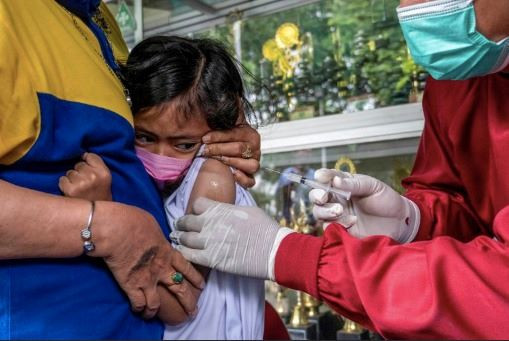Despite rise in conservatism, Islamists will be losers in 2019 poll
Change Size
 A screen shows cleric Rizieq Shihab addressing the crowd in a video call from Mecca, Saudi Arabia during Prabowo-Sandiaga's largest open rally on April 7. (JP/Wendra Ajistyatama)
A screen shows cleric Rizieq Shihab addressing the crowd in a video call from Mecca, Saudi Arabia during Prabowo-Sandiaga's largest open rally on April 7. (JP/Wendra Ajistyatama)
I
n an op-ed published in The New York Times (Feb. 14, 2019), renowned author Eka Kurniawan commented on the April 17 elections: “No matter who ends up being president, conservative Islamic groups, backed by radical groups, will win — have already won — the election.”
His piece echoed the narrative that foreign media outlets — and this paper — have been peddling since the highly divisive Jakarta gubernatorial election in 2017: that Islam is gaining ground in Indonesia’s electoral politics.
There is some truth to this argument. Sectarianism is on the rise, and Islamist groups, once considered fringe, have become mainstream and normalized. These factors played a crucial role in determining the outcome of the Jakarta election, which pitted the Christian incumbent (Basuki Tjahaja Purnama), against his Muslim challenger (Anies Baswedan).
The Jakarta election was a game-changer in many ways. Today, the man behind the religious fatwa against the defeated Christian candidate is the running mate of President Joko “Jokowi” Widodo. The Islamist groups that staged mass rallies to defend that fatwa are now ardent supporters of Jokowi’s sole challenger and long-time rival, Prabowo Subianto.
One need only glance at the videos and photos of the largest rally that Prabowo and Sandiaga Uno held on Sunday at the Gelora Bung Karno (GBK) Stadium to conclude that religion has indeed come to dominate Indonesian politics.
Eka’s claim seems irrefutable from this perspective, but that’s the long and short of it: political Islam is perceived to be on the rise because Islamic identity has become more pronounced in the public sphere in recent years, and because religious sentiment seems to have become a potent political weapon.
The reality is much more complex than that. In fact, political Islam — in its many forms — could be facing its biggest setback in decades this year.
This is because the Islamic parties failed to form a coalition to field their own candidate in the presidential race. They instead chose to pick between Jokowi and Prabowo, neither of whom could be considered an Islamic figure, or even associated with a particular Islamic group. They are card-carrying members of nationalist parties who have used religious sentiment solely as part of their campaign strategies.
This has had serious political consequences. According to a March survey by the Centre for Strategic and International Studies (CSIS), the Islamic parties are actually losing voters to their nationalist allies as a result of the coattail, or down-ballot, effect, which is the tendency for a popular political leader to draw votes for his or her party.
So what’s happening now is that the Gerindra Party, which is led by Prabowo, has taken votes from the Prosperous Justice Party (PKS) and the National Mandate Party (PAN), while the Indonesian Democratic Party of Struggle (PDI-P), of which Jokowi is a member, has taken votes from the United Development Party (PPP) and the National Awakening Party (PKB).
Some surveys predict that the PDI-P will gain about 25 percent of the vote, while Gerindra will gain about 14 percent. The PKB, meanwhile, could be the only Islamic party left standing after the April 17 elections, with all other Islamic parties expected not to pass the 4 percent legislative threshold.
This is consistent with the findings of political scientists Saiful Mujani and Thomas Pepinsky: Indonesian Muslims are becoming more pious, but this increasing religiosity does not necessarily translate into electoral support for political Islam.
The future does not look rosy for Islamist groups, either.
The Prabowo camp may have courted members of the Islam Defenders Front (FPI) and Hizbut Tahrir Indonesia (HTI) for the elections, but there is no guarantee their political alliance will go beyond April 17, when the two electoral contenders will no longer see the need to pander to any group for votes.
Prabowo and FPI leader Rizieq Shihab are strange bedfellows, united by a common enemy. During Sunday’s event at the GBK, Prabowo bailed when Rizieq addressed the rally via video call.
It is unlikely that the FPI or HTI would ever evolve into political parties to replace the Islamic parties. The FPI is a paramilitary group with no interests in governance, while the HTI is antidemocratic.
Nor will the 212 Movement save the day. It is a loose coalition of various Islamist groups that fractured soon after Rizieq fled to Saudi Arabia, according to the April 2018 report of the Institute for Policy Analysis of Conflict (IPAC). With respected 212 figure Ma’ruf Amin running alongside Jokowi, the movement has lost its historical rationale for existing at all.
To summarize, Islamic parties are losing votes, and Islamist groups, which work outside formal political structures, may soon become politically irrelevant once the dust settles on April 17 — when ideological Muslim voters will be forced to choose between two nationalist leaders who appear to care more about their electability than their constituents’ ideological aspirations.
From this perspective, how can it be said that the Islamists are pulling ahead? It may be contrary to conventional wisdom, but a nationalist leader and his nationalist party will most certainly end up winning the presidency on April 17 — whoever that may turn out to be — and the proponents of political Islam will have some soul-searching to do.
The biggest question now is whether these nationalists will lead Indonesia forward by doing away with faith-based politics and restoring our badly wounded democracy, or if they will turn back the clock even further by constantly stoking divisive and sectarian politics for short-term political gains.









